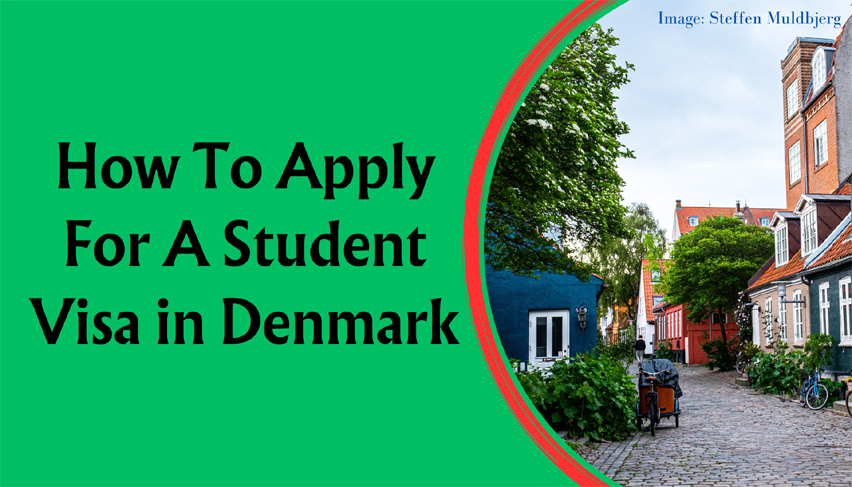The process of obtaining a student visa in Denmark in 2024 is straightforward and requires meeting specific requirements. Denmark offers an excellent education system, which attracts many international students.
If you are planning to study in Denmark in 2024, it is essential to understand the student visa process. The process is relatively simple, but specific requirements need to be met. This article will guide you through the steps of applying for a student visa in Denmark in 2024, including the necessary documents, application process, and important deadlines.
By following these instructions, you can ensure a smooth transition and enjoy your educational experience in Denmark without any visa-related concerns.
Table of Contents
ToggleRequirements For A Student Visa In Denmark
Are you dreaming of pursuing your education in Denmark? Well, before you embark on this exciting journey, it’s crucial to familiarize yourself with the requirements for a student visa. This blog post aims to guide you through the necessary elements you need to fulfill to obtain a student visa in Denmark in 2024. Let’s jump right into it!
Admission To A Danish Educational Institution
To apply for a student visa in Denmark, the first step is securing admission from a recognized Danish educational institution. These institutions include universities, colleges, and vocational schools that offer approved study programs. Once you have received an offer letter or acceptance from your chosen institution, you can move on to the next steps of the visa application process.
READ MORE: Fully Funded Government Scholarship at the University of Southern Denmark for International Students
Proof Of Financial Resources
Proving your financial capability is an essential aspect of obtaining a student visa in Denmark. The Danish government requires international students to demonstrate that they have sufficient funds to support themselves throughout their stay. This includes covering tuition fees, accommodation expenses, and daily living costs. Currently, the minimum amount required for students in Denmark is DKK 50,000 per year.
One way to prove your financial resources is by providing a bank statement showing your account balance for at least the past six months. It is important to note that this account must be under your name, ensuring its authenticity. Additionally, scholarships, sponsorships, or other financial support can also be considered as proof of financial capability.
Health Insurance And Living Arrangements
Prior to your arrival in Denmark, it is mandatory to secure comprehensive health insurance coverage. This insurance should provide medical and hospitalization benefits throughout your stay in the country. There are various insurance options available, including travel insurance plans specific to studying abroad or services offered by international student organizations.
Moreover, arranging suitable accommodation is another factor to consider. Whether you plan to live in student dormitories or rent an apartment, it is recommended to plan and secure your living arrangements before you arrive in Denmark. This way, you can settle smoothly into your new environment and focus on your studies.
By meeting these requirements for a student visa in Denmark, you’ll be one step closer to making your educational dreams a reality. Remember to ensure your admission to a Danish educational institution, provide proof of financial resources, and arrange health insurance and living arrangements. With these elements in place, you can look forward to an enriching academic experience in Denmark!
Process Of Obtaining A Student Visa
Obtaining a student visa to study in Denmark requires careful planning and understanding of the application process. The Danish immigration authorities have laid out specific guidelines that applicants need to follow to ensure a smooth visa application. In this article, we will walk you through the process of obtaining a student visa for Denmark, focusing on finding the right program and institution, the application process, the visa interview, and visa fees and processing time.
1. Finding The Right Program And Institution
Before applying for a student visa, it’s crucial to find a suitable program and institution in Denmark. The country boasts a wide range of internationally recognized universities and educational institutions offering diverse courses and degrees. Take the time to research and identify the program that aligns with your academic goals and interests.
Consider factors such as the program’s reputation, curriculum, faculty expertise, and the opportunities it provides for internships or work placements. You should also research the institution’s location, campus facilities, and the overall student experience it offers. By carefully selecting the right program and institution, you enhance your chances of a successful student visa application.
2. Application Process
Once you have found the program and institution that matches your aspirations, it is time to start the application process for a student visa in Denmark. This process typically begins with an online application submitted through the Danish Agency for International Recruitment and Integration (SIRI) website.
The application form requires you to provide personal information, educational background, language proficiency, and other relevant details. You will also need to submit supporting documents such as academic transcripts, letters of recommendation, a valid passport, proof of financial capability, and health insurance coverage.
Ensure that all the provided information and documents are accurate and up-to-date. Any discrepancies or incomplete information can lead to delays or even rejection of your visa application. It is advisable to seek assistance from your chosen institution’s international office or consult an immigration expert to ensure a smooth application process.
3. Visa Interview
After submitting the online application and supporting documents, you may be required to attend a visa interview at the Danish embassy or consulate in your home country. The purpose of the interview is to assess your genuine intention to study in Denmark and to evaluate your eligibility for a student visa.
During the interview, you may be asked questions regarding your study plan, future career goals, financial stability, and ties to your home country. It is essential to be well-prepared and confident in your responses. Make sure to demonstrate your enthusiasm for studying in Denmark and how it aligns with your long-term academic and career aspirations.
4. Visa Fees And Processing Time
When applying for a student visa in Denmark, there are certain fees associated with the process. The exact amount may vary, so it is important to check the current fee structure on the Danish immigration authorities’ official website.
| Visa Type | Fee |
|---|---|
| Student Visa | *** DKK |
The processing time for a student visa can also vary depending on a range of factors, including the time of year, volume of applications, and the complexity of your case. It is advisable to apply well in advance to allow for sufficient processing time, usually several months before the intended start date of your program.
Keep in mind that the above information provides only a general overview of the process of obtaining a student visa for Denmark in 2024. It is crucial to refer to the official Danish immigration authorities’ website and consult your chosen institution’s international office for the most up-to-date and accurate information regarding the visa application process.
Benefits And Limitations Of A Student Visa In Denmark
A student visa in Denmark provides several advantages, such as access to quality education, the opportunity to explore a vibrant cultural scene, and gain valuable international experience. However, it also comes with certain limitations, including financial requirements and restrictions on working hours.
Understanding these factors is crucial for students planning to study in Denmark.
Benefits and limitations of a student visa in Denmark Denmark is renowned for its world-class education system, making it a top destination for international students. If you are considering pursuing your studies in Denmark in 2024, it is important to understand the benefits and limitations that come with a student visa. In this section, we will explore the access to quality education and research opportunities, part-time work opportunities, and post-graduation options that a student visa in Denmark offers, as well as the limitations and restrictions that you need to be aware of.
READ MORE: Denmark Scholarships for International Students 2024
Access To Quality Education And Research Opportunities
Denmark prides itself on providing high-quality education and research opportunities to students from all over the world. With a student visa, you will have access to renowned universities and institutes that offer a wide range of programs and disciplines. These institutions are known for their innovative teaching methods and cutting-edge research, giving you the opportunity to learn from esteemed professors and engage in groundbreaking projects. The interdisciplinary approach adopted by Danish universities nurtures critical thinking and fosters creativity, preparing students to excel in their chosen fields.
Part-time Work Opportunities
One of the advantages of holding a student visa in Denmark is the opportunity to work part-time while studying. As an international student, you can work up to 20 hours per week during the academic year and full-time during semester breaks. This not only allows you to gain valuable work experience but also helps support your financial needs. Working part-time in Denmark can enhance your employability skills, improve your language proficiency, and provide insights into the Danish job market. Additionally, part-time work enables you to interact with locals, fostering cultural integration and enriching your overall study abroad experience.
Post-graduation Options
Once you have completed your studies, a student visa in Denmark opens up avenues for post-graduation options. Denmark offers various post-study work opportunities that allow you to stay and work in the country after graduation. The Positive List scheme, for example, allows talented graduates to seek employment relevant to their field of study without the need for a work permit. Furthermore, Denmark encourages entrepreneurship, providing support and resources for international students who wish to start their own businesses or join startups in the country. These post-graduation options make Denmark an attractive destination for those seeking to launch their careers on a global scale.
Limitations And Restrictions
While a student visa in Denmark offers numerous benefits, it is important to be aware of the limitations and restrictions that come with it. As an international student, you are expected to be enrolled in a full-time study program, meet academic requirements, and demonstrate sufficient financial means to support yourself during your stay. Additionally, there may be restrictions on the number of hours you can work during the academic year or limitations on accessing certain types of social welfare benefits. It is crucial to adhere to these regulations to maintain your legal status and enjoy a smooth academic journey in Denmark. In conclusion, a student visa in Denmark provides access to quality education and research opportunities, part-time work options, and post-graduation pathways. However, it is important to be mindful of the limitations and restrictions that come with it. By understanding and adhering to the regulations, you can make the most of your study abroad experience in Denmark and set yourself up for a successful future.
Conclusion
Obtaining a student visa for Denmark in 2024 can open up exciting opportunities for international students. With its quality education system, welcoming environment, and excellent post-study work options, Denmark is an ideal destination for those looking to enhance their academic and professional prospects.
By following the necessary steps and meeting the requirements, students can embark on a transformative journey in one of the world’s most progressive and culturally rich countries.



